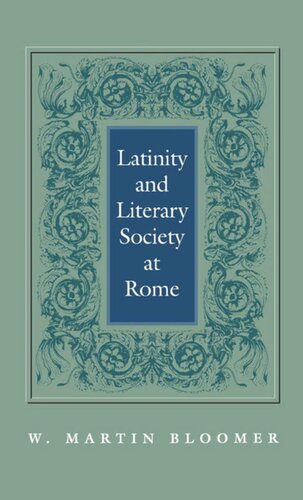

Most ebook files are in PDF format, so you can easily read them using various software such as Foxit Reader or directly on the Google Chrome browser.
Some ebook files are released by publishers in other formats such as .awz, .mobi, .epub, .fb2, etc. You may need to install specific software to read these formats on mobile/PC, such as Calibre.
Please read the tutorial at this link: https://ebookbell.com/faq
We offer FREE conversion to the popular formats you request; however, this may take some time. Therefore, right after payment, please email us, and we will try to provide the service as quickly as possible.
For some exceptional file formats or broken links (if any), please refrain from opening any disputes. Instead, email us first, and we will try to assist within a maximum of 6 hours.
EbookBell Team

0.0
0 reviewsFor centuries after the fall of the Roman empire, the ability to write and speak pure Latin was the mark of the true scholar. But although such skill was esteemed in medieval times, the language of ancient Rome was as various as the styles of slaves and masters.
Latinity and Literary Society at Rome reaches back to the early Roman empire to examine attitudes toward latinity, reviewing the contested origins of scholarly Latin in the polemical arena of Roman literature. W. Martin Bloomer shows how that literature's reflections on correct and incorrect speech functioned as part of a wider understanding of social relations and national identity in Rome.
Bloomer's investigation begins with questions about the sociology of Latin literature—what interests were served by the creation of high style and how literary stylization constituted a system of social decorum—and goes on to offer readings of selected texts. Through studies of works ranging from Varro's De lingua latina to the verse fables of Augustine's freeman Phaedrus to the Annals of Tacitus, Bloomer examines conflicting claims to style not simply to set true Latin against vulgarism but also to ask who is excluding whom, why, and by what means.
These texts exemplify the ways Roman literature employs representations of, and reflections on, proper and improper language to mirror the interests of specific groups who wished to maintain or establish their place in Roman society. They show how writers sought to influence the fundamental social issue of who had the power to confer legitimacy of speech and how their works used claims of linguistic propriety to reinforce the definition of "Romanness."
Through Bloomer's study latinity emerges as a contested field of identity and social polemic heretofore unrecognized in classical scholarship. With its fresh interpretations of major and minor texts, Latinity and Literary Society at Rome is a literary history that significantly advances our understanding of the place of language in ancient Rome.